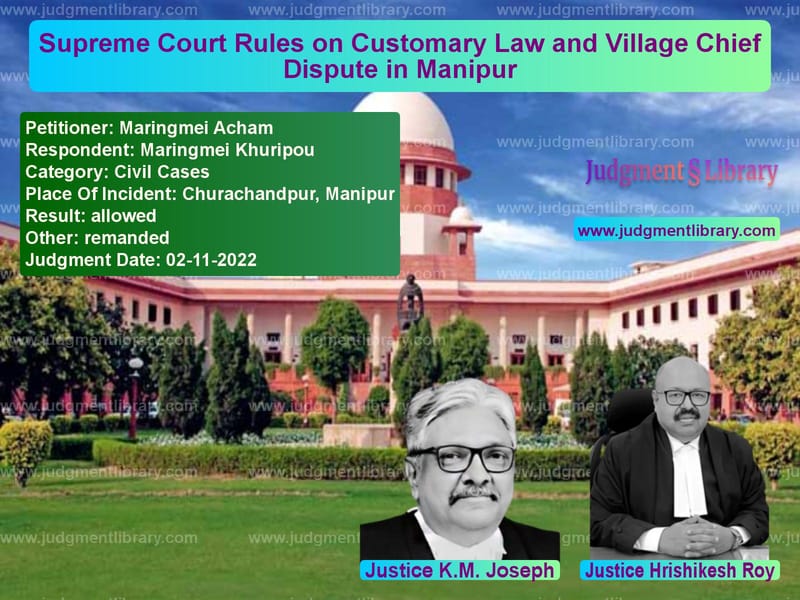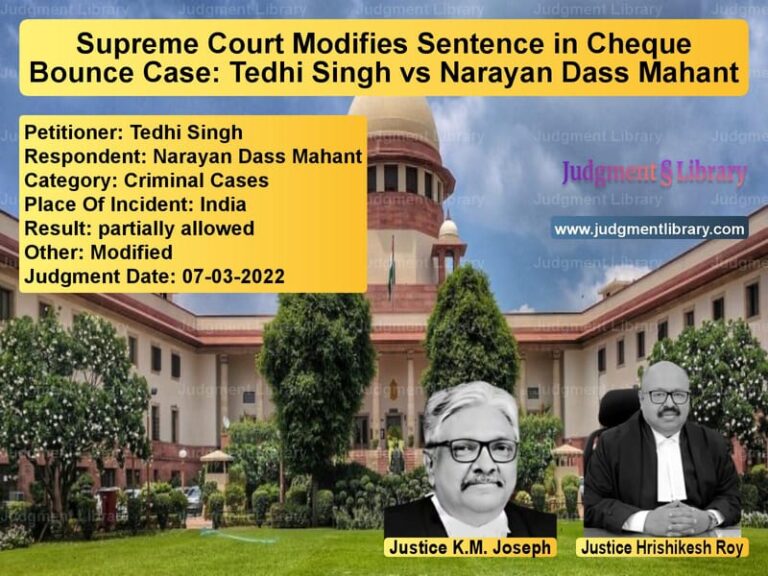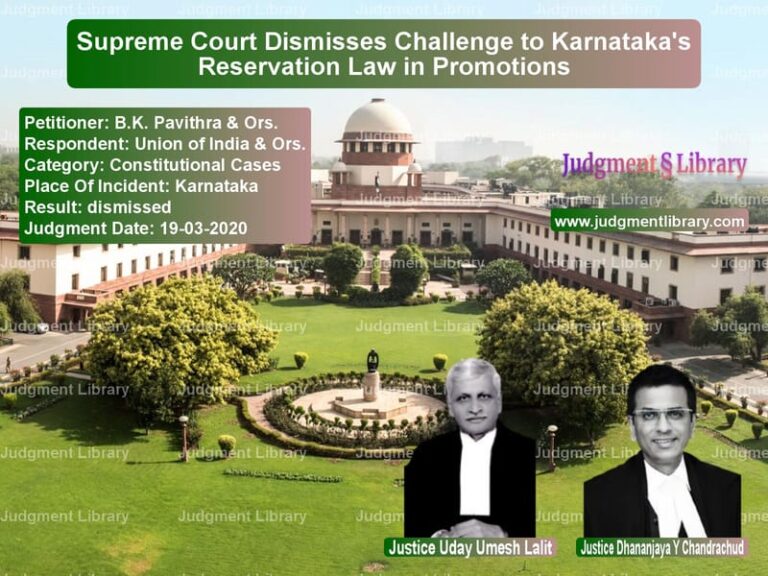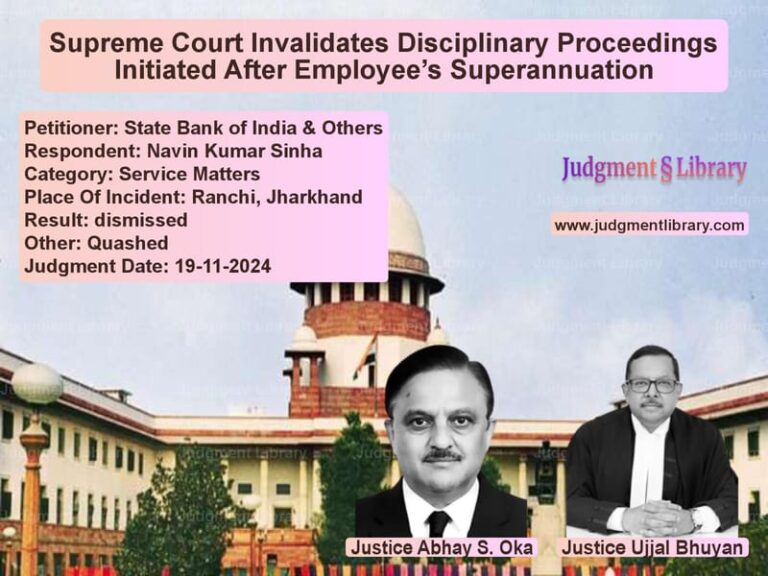Supreme Court Rules on Customary Law and Village Chief Dispute in Manipur
The Supreme Court has delivered a significant ruling in the case of Maringmei Acham vs. M. Maringmei Khuripou, addressing the dispute over the hereditary chiefship (Khullakpa) of Lamdan Kabui village in Manipur. The legal battle revolved around customary law, succession rights, and procedural abatement in civil suits.
Background of the Case
The dispute originated when Maringmei Thaitoungam, the father of the appellant, filed a declaratory suit in 2014 claiming hereditary rights as the chief of Lamdan Kabui village. He sought a declaration that he was the rightful chief and challenged the appointment of Maringmei Khuripou as chief by the Deputy Commissioner, Churachandpur.
Thaitoungam also sought an injunction against Khuripou from acting as chief and felling trees in the village. However, before the case could be resolved, Thaitoungam passed away in September 2014, leading to procedural complexities regarding the continuation of the suit.
Key Legal Issues
- Whether the suit abated upon the death of the sole plaintiff.
- Whether the appellant, as the legal heir, could continue the suit.
- Whether the High Court erred in ruling that the suit had abated due to the failure to implead the legal representative within time.
- Whether the declaratory relief regarding the chiefship of the village could be pursued by the appellant.
Arguments by the Petitioner (Maringmei Acham)
The petitioner contended:
- That as per Rongmei Kabui Customary Law, the chiefship was hereditary and, upon the death of his father, he was the rightful successor.
- That the High Court’s ruling that the suit had abated due to the failure to bring legal representatives on record was incorrect, as an application had been filed and allowed.
- That the appellate court had already recognized his substitution as the legal heir.
- That the case fell under the Supreme Court’s previous ruling in Rangubai Kom Shankar Jagtap vs. Sunderabai Bhratar Sakharam Jedhe (AIR 1965 SC 1794), which held that substitution in an interlocutory appeal enures for all subsequent stages of the suit.
Arguments by the Respondent (Maringmei Khuripou)
The respondent countered:
- That the declaratory relief sought by the original plaintiff was personal and could not be pursued by the legal heir.
- That since no timely application was made to substitute the legal representative in the main suit, it had abated.
- That the Deputy Commissioner’s order recognizing him as chief was valid and had not been properly challenged.
Supreme Court’s Observations
The Supreme Court analyzed the procedural implications of the suit’s abatement and the hereditary nature of the chiefship. The Court observed:
“The High Court’s finding that the suit had abated was erroneous, as substitution had been allowed in the appellate proceedings. Once the legal heir was brought on record at one stage, it enures for all subsequent proceedings.”
The Court further held:
“The hereditary nature of the chiefship under Rongmei Kabui Customary Law provides the legal heir with a legitimate interest in the proceedings. Thus, the suit should not have been dismissed on procedural grounds.”
Judgment Outcome
The Supreme Court set aside the High Court’s order and directed the consolidation and expedited disposal of both related suits:
- Original Declaratory Suit No. 3 of 2014 (filed by the appellant’s father).
- Original Injunction Suit No. 39 of 2014 (filed by the respondent challenging the appellant’s claim to the chiefship).
The Supreme Court instructed the Civil Judge (Senior Division), Churachandpur, to resolve the matter within eight months.
Key Takeaways from the Judgment
- Legal heirs can continue declaratory suits if the underlying cause of action survives.
- Procedural abatement does not apply if the legal representative is substituted at any stage of the suit.
- Customary law plays a crucial role in hereditary succession cases.
- Judicial efficiency requires related suits to be consolidated for effective resolution.
Conclusion
The Supreme Court’s ruling in this case reinforces the importance of procedural fairness and the recognition of customary law in succession disputes. The decision ensures that claims rooted in traditional governance structures receive due consideration in legal proceedings.
Petitioner Name: Maringmei Acham.Respondent Name: Maringmei Khuripou.Judgment By: Justice K.M. Joseph, Justice Hrishikesh Roy.Place Of Incident: Churachandpur, Manipur.Judgment Date: 02-11-2022.
Don’t miss out on the full details! Download the complete judgment in PDF format below and gain valuable insights instantly!
Download Judgment: maringmei-acham-vs-maringmei-khuripou-supreme-court-of-india-judgment-dated-02-11-2022.pdf
Directly Download Judgment: Directly download this Judgment
See all petitions in Succession and Wills
See all petitions in Landlord-Tenant Disputes
See all petitions in Specific Performance
See all petitions in Judgment by K.M. Joseph
See all petitions in Judgment by Hrishikesh Roy
See all petitions in allowed
See all petitions in Remanded
See all petitions in supreme court of India judgments November 2022
See all petitions in 2022 judgments
See all posts in Civil Cases Category
See all allowed petitions in Civil Cases Category
See all Dismissed petitions in Civil Cases Category
See all partially allowed petitions in Civil Cases Category







